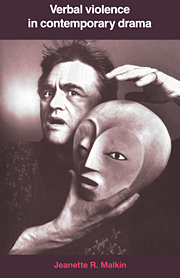1 - Introduction
Published online by Cambridge University Press: 26 February 2010
Summary
Dramatic inquiry into the relationship between man and his language is hardly a uniquely contemporary (post-World War II) phenomenon. Jarry's King Ubu (1896), Shaw's Pygmalion (1913), Hofmannsthal's The Difficult Man (Der Schwierige, 1921), some Dada theater evenings, the Volksstücke of Ödön von Horváth and Marieluise Fleisser all suggest, in varying ways, a concern with this issue. The group of postwar plays studied here differ, however, in their elevation of language to the central action, and actor; in their pessimistic vision of man's ability to remain free and humane in the face of verbal coercion; and in their warning that man has become a prisoner of his speech. The violent action of language is directed both against the audience and against the characters. In either case language is on trial: it stands accused of usurping and molding reality, of replacing critical thought with fossilized and automatic verbiage, of violating man's autonomy, of destroying his individuality.
The plays that animate these views are varied; they vary in genre, in idiom, and in subject matter. However, they all answer to the double criterion according to which I chose my texts; thematically, they are all concerned with man's subjugation or victimization through imposed or inherited verbal structures; dramatically!, they all demonstrate concrete actions of language which are violent, coercive, and domineering. Language is either metamorphosed into a dramatic antagonist which destroys the characters or forces them into conformity with its pre-given structures and precepts; or it is portrayed as an inescapable prison which determines the characters' fate and defines the limits of their world – conceptual and moral.
- Type
- Chapter
- Information
- Verbal Violence in Contemporary DramaFrom Handke to Shepard, pp. 1 - 9Publisher: Cambridge University PressPrint publication year: 1992

